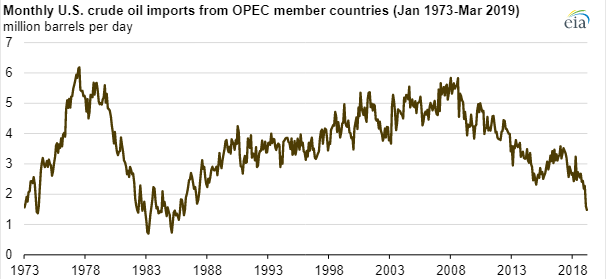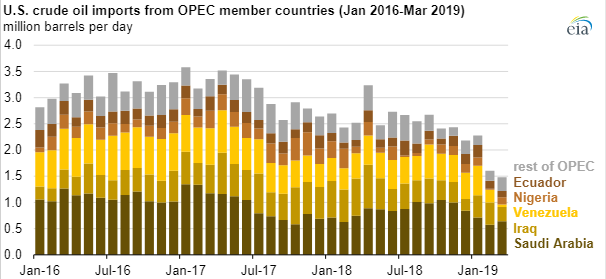Energy
US Reliance On OPEC Oil Hits 30-Year Low
No featured image available
U.S. crude oil imports from the Saudi Arabian-led OPEC fell to a 30-year low, according to the latest federal figures.
OPEC imports fell to 1.5 million barrels per day in March, which is the lowest level since March 1986, the U.S. Energy Information Administration reported Thursday. EIA said OPEC imports fell “as domestic crude oil production has increased.”

Source: U.S. Energy Information Administration, Petroleum Supply Monthly
“Americans are no longer dependent on foreigners for their energy, and Americans are getting good jobs producing that oil and gas right here at home,” Dan Kish, a distinguished senior fellow at the Institute for Energy Research, told The Daily Caller News Foundation.
“The threat against American energy security has shifted from OPEC to the halls of Congress, where members talk of the Green Raw Deal and carbon taxes that could torpedo our energy miracle,” Kish said.
The last time Americans were this independent from OPEC oil former President Ronald Reagan was in office and Halley’s Comet was visible in the night’s sky. EIA also noted that U.S. sanctions on Venezuela drove imports to a record low, including periods when the U.S. took no oil from it.
The U.S. also imported less from Iraq. Other OPEC members shipped less to the U.S. as part of the oil cartel’s strategy to keep crude prices up in the face of booming American production.
“In the first three months of 2019, the volume of U.S. crude oil imports from Saudi Arabia and Iraq — the two largest sources of imports from OPEC in 2018 — have averaged 26% and 28% below their 2018 average levels,” EIA reported.
EIA also reported the West Coast supplanted the Gulf Coast as the largest destination for OPEC crude oil. In fact, the Gulf Coast is now a net exporter of oil while West Coast states, led by California, are more reliant on OPEC crude.

Source: U.S. Energy Information Administration, Petroleum Supply Monthly
While the U.S. is less reliant on OPEC crude, the oil cartel can still have a drastic effect on prices. That’s currently on display as tensions between the U.S. and Iran escalate after an attack on two oil tankers Thursday in the Strait of Hormuz.
The attacks sent crude prices soaring on news of the attacks, which occurred in the world’s biggest oil choke point. U.S. officials blamed Iran for the attacks, but Iranian officials denied any connections.
All content created by the Daily Caller News Foundation, an independent and nonpartisan newswire service, is available without charge to any legitimate news publisher that can provide a large audience. All republished articles must include our logo, our reporter’s byline and their DCNF affiliation. For any questions about our guidelines or partnering with us, please contact [email protected].

